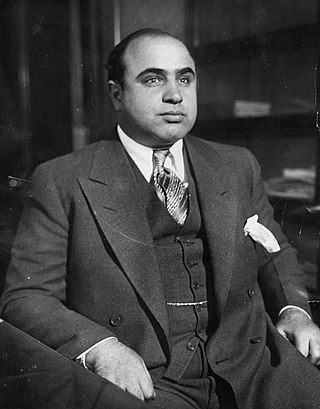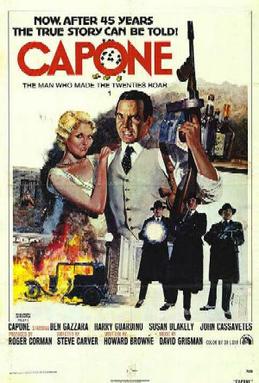Related Research Articles

Alphonse Gabriel Capone, sometimes known by the nickname "Scarface", was an American gangster and businessman who attained notoriety during the Prohibition era as the co-founder and boss of the Chicago Outfit from 1925 to 1931. His seven-year reign as a crime boss ended when he went to prison at the age of 33.

John Donato Torrio was an Italian-born American mobster who helped build the Chicago Outfit in the 1920s later inherited by his protégé Al Capone. Torrio proposed a National Crime Syndicate in the 1930s and later became an adviser to Lucky Luciano and his Luciano crime family.

Earl J. "Hymie" Weiss, was a Polish-American mob boss who became a leader of the Prohibition-era North Side Gang and a bitter rival of Al Capone. He was known as "the only man Al Capone feared".

Sleeman Breweries is a Japanese-owned Canadian brewery founded by John Warren Sleeman in 1988 in Guelph, Ontario. The company is the third-largest brewing company in Canada. Along with its own Sleeman brands, the company produces under licence the Stroh's family of brands, Maclays Ale and Sapporo Premium beers for sale in Canada. The company's parent Sapporo owns 4.2 per cent of Ontario's primary beer retailer The Beer Store.

IBC Root Beer is an American brand of root beer now owned by Keurig Dr Pepper. It was originally owned by IBC until it went out of business.

The Theodore Hamm's Brewing Company was an American brewing company established in 1865 in Saint Paul, Minnesota. Becoming the fifth largest brewery in the United States, Hamm's expanded with additional breweries that were acquired in other cities, including San Francisco, Los Angeles, Houston, and Baltimore.

Frank Ralph Nitto, known as Frank Nitti, was an Italian-American organized crime figure based in Chicago. Bodyguard of Al Capone, Nitti was in charge of all money flowing through the operation. Nitti later succeeded Capone as acting boss of the Chicago Outfit.

Vincenzo Colosimo, known as James "Big Jim" Colosimo or as "Diamond Jim", was an Italian-American Mafia crime boss who emigrated from Calabria, Italy, in 1895 and built a criminal empire in Chicago based on prostitution, gambling and racketeering. He gained power through petty crime and heading a chain of brothels. From 1902 until his death in 1920, he led a gang known after his death as the Chicago Outfit. Colosimo was assassinated on May 11, 1920, and no one was ever charged with his murder. Johnny Torrio, an enforcer whom Colosimo imported in 1909 from New York, seized control of Colosimo's businesses after his death. Al Capone, a close associate of Torrio, has been accused of involvement in Colosimo's murder but was not yet in Chicago at the time.

The Chicago Outfit is an Italian-American Mafia crime family based in Chicago, Illinois, which originated in the city's South Side in 1910. The organization is part of the larger Italian-American Mafia.
The Valley Gang was an Irish-American street gang in Chicago, Illinois during the early 20th century, which ultimately made the transition to organized crime and became a de facto extension of the Chicago Outfit under Al Capone.
Chicago, Illinois, has a long history of organized crime and was famously home to the American mafia figure Al Capone. This article contains a list of major events related to organized crime.
The Genna crime family, was a crime family that operated in Prohibition-era Chicago. From 1921 to 1925, the family was headed by the six Genna brothers, known as the Terrible Gennas. The brothers were Sicilians from the town of Marsala and operated from Chicago's Little Italy and maintained control over the Unione Siciliana. They were allies with fellow Italian gang the Chicago Outfit. After a bloody war led to their demise in the 1920s, the gang was eventually absorbed by the Chicago Outfit.
The North Side Gang, also known as the North Side Mob, was an Irish-American criminal organization within Chicago during the Prohibition era from the early 1920s to the mid-1930s. It was the principal rival of the South Side Gang, also known as the Chicago Outfit, the crime syndicate of Italian-Americans Johnny Torrio and Al Capone.

The Atlantic City Conference held between 13–16 May 1929 was a historic summit of leaders of organized crime in the United States. It is considered by most crime historians to be the earliest organized crime summit held in the US. The conference had a major impact on the future direction of the criminal underworld and it held more importance and significance than the Havana Conference of 1946 and the Apalachin meeting of 1957. It also represented the first concrete move toward a National Crime Syndicate.

Capone is a 1975 American action crime film directed by Steve Carver, written by Howard Browne, and starring Ben Gazzara, Harry Guardino, Susan Blakely, John Cassavetes, and Sylvester Stallone in an early film appearance. The film is a biography of the infamous gangster Al Capone.

The Falstaff Brewing Corporation was an American brewery located in St. Louis, Missouri. With roots in the 1838 Lemp Brewery of St. Louis, the company was renamed after the Shakespearean character Sir John Falstaff in 1903. Production peaked in 1965 with 7,010,218 barrels brewed and then dropped 70 percent in the next 10 years. While its smaller labels linger on today, its main label Falstaff Beer went out of production in 2005. The rights to the brand are owned by Pabst Brewing Company.

Charles Dean O'Banion was an American mobster who was the main rival of Johnny Torrio and Al Capone during the brutal Chicago bootlegging wars of the 1920s. The newspapers of his day made him better known as Dion O'Banion, although he never went by that first name. He led the North Side Gang until 1924, when he was shot and killed, reportedly by Frankie Yale, John Scalise and Albert Anselmi.

Al Capone is a 1959 biographical crime drama film directed by Richard Wilson, written by Malvin Wald and Henry F. Greenberg and released by Allied Artists. It stars Rod Steiger as Al Capone.

The Making of the Mob: Chicago is an American television miniseries, and the second season of The Making of the Mob, based on the iconic Chicago gangster Al Capone and his rise and fall in the Chicago Mafia. It is produced by Stephen David and premiered on July 11, 2016, on AMC in eight parts.
References
- ↑ After Capone: The Life And World Of Chicago Mob Boss Frank "the Enforcer" Nitti
- ↑ http://www.ftc.gov/os/annualreports/ar1944.pdf [ bare URL PDF ]
- ↑ Time magazine article from 1946
- ↑ Manhattan Brewing Company - Breweriana
- ↑ "The American "MAFIA" - Kefauver: Peterson Testimony - June to August, 1950". Archived from the original on 2007-04-29. Retrieved 2007-07-27.
- ↑ Tavern Trove: Manhattan Brewery
- The Great Chicago Beer Cans, by Phil Pospychala & Joe McFarland, copyright 1979 by SILVER FOX PRODUCTIONS.
- Capone and Manhattan: The Myth Persists, by Rich LaSusa, The Breweriana Collector, a publication of the National Association Brewreiana Advertising, volume 130.
- After Capone: The Life And World Of Chicago Mob Boss Frank "the Enforcer" Nitti by Mars Eghigian Jr. Cumberland House Publishing (February 13, 2006)